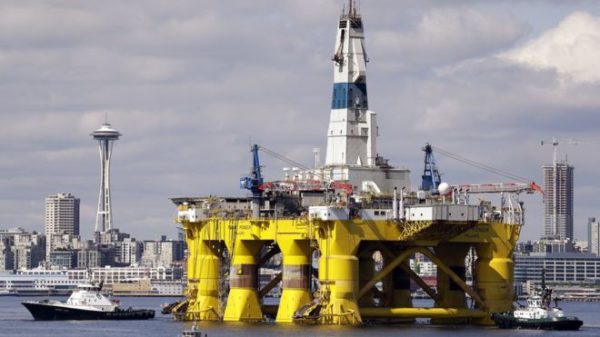Obama bans oil drilling ‘permanently’ in millions of acres of ocean
December 29, 2016 · By US & Canada for www.bbc.com

Arctic rigs like the “polar pioneer” were never actually deployed
Outgoing US President Barack Obama has permanently banned offshore oil and gas drilling in the “vast majority” of US-owned northern waters.
Mr Obama designated areas in the Arctic and Atlantic oceans as “indefinitely off limits” to future leasing.
The move is widely seen as an attempt to protect the region before Mr Obama leaves office in January.
Supporters of president-elect Donald Trump could find it difficult to reverse the decision.
Canada also committed to a similar measure in its own Arctic waters, in a joint announcement with Washington.
The White House said the decision was for “a strong, sustainable and viable Arctic economy and ecosystem.” It cited native cultural needs, wildlife concerns, and the “vulnerability” of the region to oil spills as some of the reasons for the ban.
But while Canada will review the move every five years, the White House insists Mr Obama’s declaration is permanent.
The decision relies on a 1953 law which allows the president to ban leasing of offshore resources indefinitely.
During the election campaign, Donald Trump said he would take advantage of existing US oil reserves, prompting concern from environmental groups.
But supporters have already suggested that any attempt to reverse the “permanent” decision outlined by the law would be open to a legal challenge.
Reacting to the Arctic declaration, Friends of the Earth said: “No president has ever rescinded a previous president’s permanent withdrawal of offshore areas from oil and gas development.
“If Donald Trump tries to reverse President Obama’s withdrawals, he will find himself in court.”
However, the American Petroleum Institute said “there is no such thing as a permanent ban,” and that it hoped Mr Trump’s administration would simply reverse the decision.
Boost for fragile waters: Roger Harrabin, environment analyst
The ban is a huge boost for conservation in the fragile waters of the Arctic – and for campaigners urging action against climate change.
The oil industry has a bad safety record in northern waters already. In 1989 the tanker Exxon Valdez ran aground in Alaska, spilling hundreds of thousands of barrels of crude oil, polluting 1,300 miles of coastline. Some of the oil endures, and some animal species have yet to recover.
In 2014, Shell’s drilling rig the Kulluk also ran aground in the Arctic’s tempestuous seas. The firm subsequently halted Arctic exploration.
Northern waters are so cold that it takes bacteria much longer to break up oil products than in the warm waters of the Gulf. And the drilling conditions are among the most challenging on Earth.

Exxon Mobil chief Rex Tillerson has been appointed as the next US secretary of state
President Obama is heeding advice from scientists warning that humans have already discovered three times more fossil fuels than we can burn without risking the climate.
Oil firms will still want to explore for further profits, though. And the next secretary of state, Exxon’s Rex Tillerson, may offer the industry a route round the ban by paving the way to an Arctic drilling deal with Russia.
Mr Trump has also raised fears among some environmental campaigners through his choices for senior White House roles.
Rex Tillerson, chief of oil company Exxon Mobil, has been named his secretary of state. His energy secretary, Rick Perry, has previously called for less regulation of the oil industry in his role as governor of Texas.
Environmental groups strongly criticised both appointments.
Very little oil drilling currently takes place in the Arctic region, as it is more expensive and difficult than other available options.






